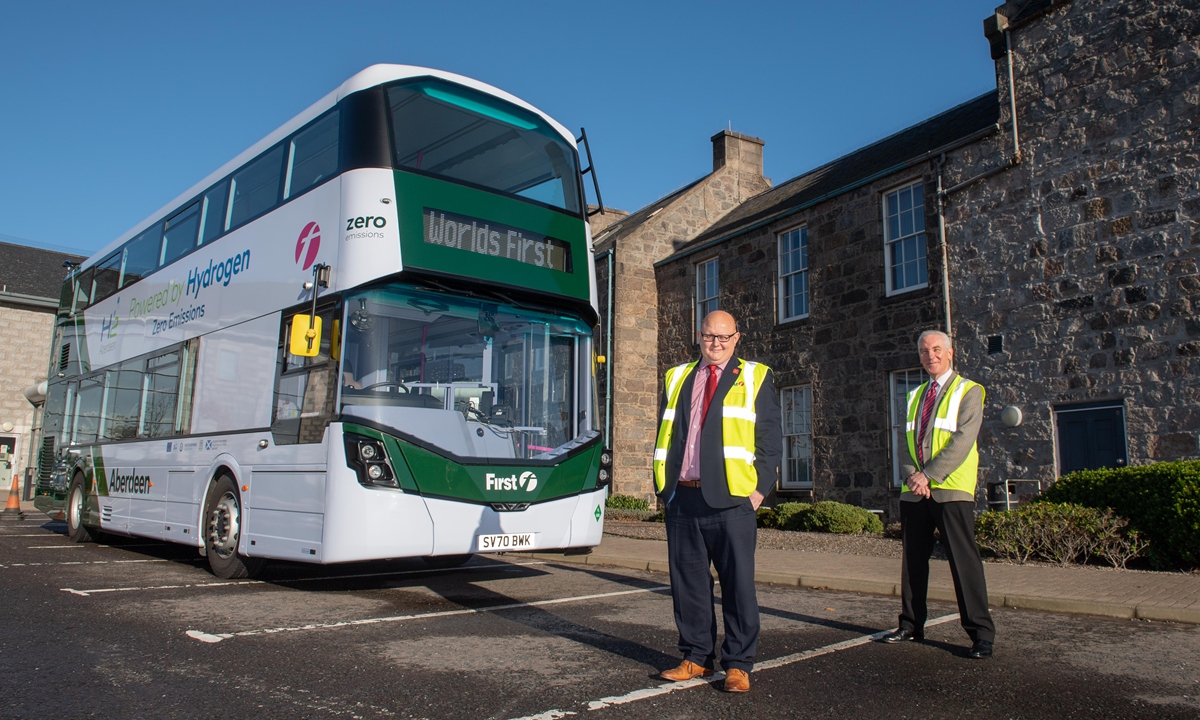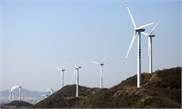China, UK to strengthen cooperation on zero emission vehicles amid green energy push: UK ambassador

The hydrogen-powered, zero-emission double-decker bus in Ellon in Aberdeenshire, Scotland Photo: AFP
China-UK cooperation on zero emission vehicles is expected to remain strong in the future as both nations are ramping up efforts to realize their commitment on zero emissions on a certain deadline, Caroline Wilson, UK Ambassador to China, said on Wednesday.
"Given the role a transition to zero emission vehicles will play in reaching wider climate goals and UK-China leadership in this sector, our cooperation on zero emission vehicles is vitally important," Wilson told the Global Times in an exclusive interview on Wednesday ahead of the 26th UN Climate Change Conference of the Parties (COP26) in November.
The UK's COP26 Presidency has been working with countries and companies around the world to convene some of the world's largest automotive markets and vehicle manufacturers in the COP26 Zero Emissions Vehicle Transition Council to accelerate the move to clean vehicles. "China is welcomed to join the Council's discussions," Wilson said, adding that "the UK has been working closely with Chinese organizations to support low carbon transition of the transport sector. We enjoy strong commercial cooperation in this sector as well."
Chinese auto firms, including Geely, BYD and leading battery technology company Envision AESC, have set up their research and development centers, manufacturing facilities and factories in the UK to develop next generation products and technologies.
"I expect this cooperation to remain strong in the future, evidenced by the recent memorandum of understanding signed between China Automotive Technology and Research Center, the UK's Office for Zero Emission Vehicles (OZEV) and the University of California, to set up a China-US-UK ZEV Policy Lab which will strengthen exchanges and cooperation on zero emission vehicles between the three countries," said the ambassador.
China and Britain have maintained a good cooperative relationship in coping with climate change and both have put forward stronger independent contribution targets and carbon neutrality visions.
China aims to have CO2 emissions peak before 2030 and achieve carbon neutrality before 2060.
By 2035, electric vehicles (EVs) are likely to become mainstream in the sales of vehicles in China, while those used in public transportation will run exclusively on electricity, according to a development plan for the NEV industry from 2021 to 2035 unveiled by China's State Council in November 2020.
Britain announced the ambitious date of 2030 for phasing out all new petrol and diesel cars and vans. Furthermore, from 2035, all new cars and vans sold in the UK will be zero emission vehicles.
"If we are to meet the Paris Agreement goals, we need to double the pace of the global transition to zero emission vehicles," Wilson said.
The ambition is backed by a £2.8 billion ($3.8 billion) package of measures to support industry and consumers to make the switch to cleaner vehicles.
"A detailed delivery plan will be published soon to stimulate both supply and demand for EVs," she added.
British new car registrations fell by 34 percent on a yearly basis to 215,312 units in September, marking the weakest September in at least 23 years, according to industry data published by UK's Society of Motor Manufacturers and Traders.
Despite that, more than 32,000 battery-powered electric cars were registered last month, a new record close to the total number of registrations in 2019.





